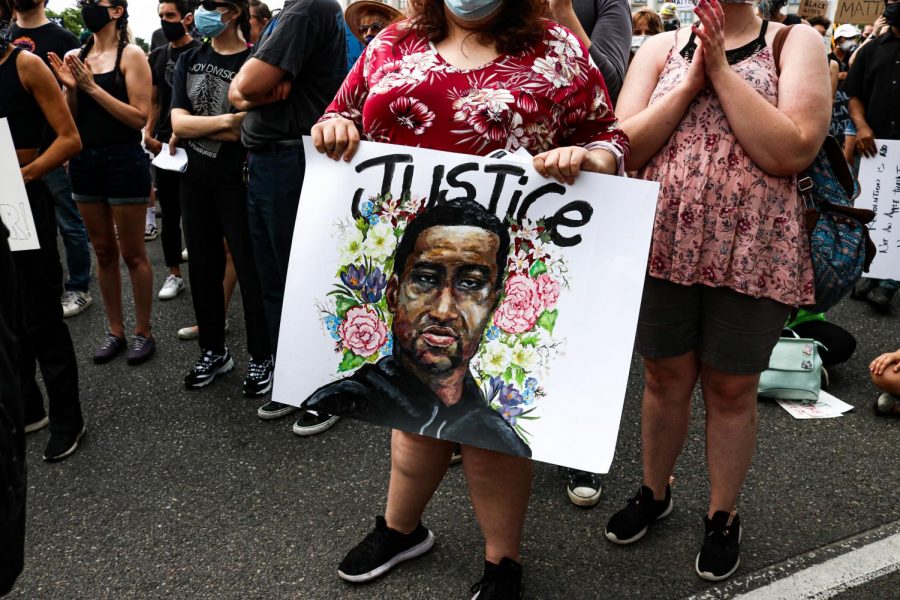Alexander: Don’t Let Black Lives End in Vain
Protester with a sign for George Floyd at the Utah Capitol on June 4, 2020. (Ivana Martinez | The Daily Utah Chronicle)
April 2, 2021
I was 11 years old and living near Ferguson, Missouri, when Michael Brown was shot in the back six times by police officer Darren Wilson. I saw firsthand the outrage in the community following Brown’s death. As we watched the protests, riots and the militarized police response, my family’s distrust in law enforcement grew. The effects on my family last today, through rules my parents imposed on my siblings and me (who are half Black). We’ve been instructed about what to say and do if we encounter police. We aren’t allowed to wear hoods or walk alone at night, and if we get pulled over, we know to keep our hands on the wheel or dashboard and declare to the officer when we are moving our hands and where to. From Brown’s death onward, a sense of fear was instilled in us for our own safety, because we learned that some officers can get away with taking our lives.
This is the reality for people of color all across the nation. Distrust between communities and police, which is ever prevalent after the death of George Floyd and numerous other Black people, stems from a lack of police accountability. We as community members need to know that police accountability matters to the police employed to protect us.
Because of my early introduction to police brutality, I’ve always been very critical of law enforcement — but I also believe there are ways to improve relations between law enforcement and community members. One way is through the passage of the George Floyd Justice in Policing Act. This federal bill would create a nationwide database of police misconduct, ban chokeholds, prohibit certain no-knock warrants and end racial and religious profiling. The bill would also aid people in pursuing charges against police officers engaged in misconduct that infringes on their civil rights. Through these measures of increased accountability, communities can feel safer knowing that police officers who abuse their power will be held accountable. However, increasing accountability is not the sole way to improve police departments and restore community relations.
In addition to increasing accountability, true reform can start within police departments themselves through a deep analysis of police culture. Police culture includes the shared attitudes and beliefs of the role of police officers, and can directly influence officer discretion, decisions, behaviors and misconduct.
The current culture of policing consists of a warrior mentality, where officers see themselves pitted against communities. But some departments are trying to move toward a guardian mentality, where customer service and social work are at the forefront of their day-to-day operations. These departments are trying to foster more positive relations with their communities through upholding the rights of individuals and helping their neighborhoods thrive.
Still, many police departments are stuck in the past. University of Utah’s Bethany Gull, a PhD candidate who teaches Criminology, explained that to some officers, “It’s just ‘be a hard-nosed law enforcement officer and just get in there and kick some ass.’ Overall we know that police culture is very much about protecting your own.” This mentality hinders organizational changes in departments, and prevents improvements to police attitudes and operations. It’s only through a shift in mindset toward the community that police reform can truly happen.
Through the George Floyd bill and changes in mentality, law enforcement officers should be able to embrace police reform. However, I understand that not everyone is on board with the bill. Some police officers feel the policies it introduces would constrict in their efforts to protect their communities. But the best police departments already abide by these rules. They have already proven to their communities that transparency, accountability and empathy are essential components of their departments’ efforts. The bill simply attempts to make police departments like these model departments, singling out misconduct and corruption as the primary issues with “rotten apples” in policing. The passage of the bill is critical in helping aid the improvement of relations between community members and the police, and therefore needs police support.
In the wake of George Floyd’s murder and the Black Lives Matter protests of 2020, and to repair the broken trust between citizens and police, we need to know that police accountability is a priority in the departments safeguarding us. Through understanding and addressing toxic aspects of police culture, adopting community-oriented policing models and accepting criticism for improvement, law enforcement can increase their accountability and connections to citizens. We can then move toward a more unified front for justice and keep American streets safe, including in Black neighborhoods.









John Doea • Apr 2, 2021 at 10:24 pm
He wasn’t shot “… in the back…” as you stated in the very first sentence. The Obama Justice Department did NOT think this was an unjustified shooting. Not everything is racial bias